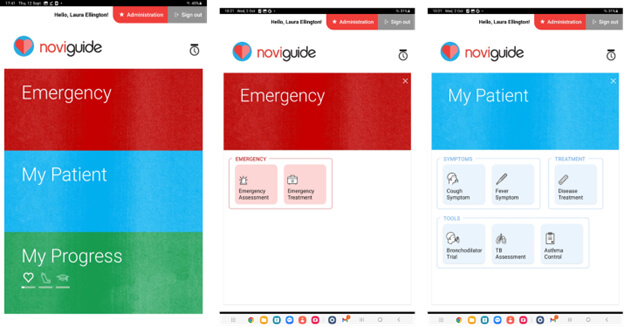Current Research
The Ellington Lab's current active projects include:
ALRITE Digital Clinical Decision Support
 Optimizing and evaluating a digital tool to promote ALRI guideline adherence and improve clinical and service outcomes in Uganda
Optimizing and evaluating a digital tool to promote ALRI guideline adherence and improve clinical and service outcomes in Uganda
Acute lower respiratory illnesses (ALRI) are the leading cause of death in young children, particularly in sub-Saharan Africa. Despite the widespread adoption of evidence-based guidelines for pediatric outpatient care, managing ALRI in resource-limited settings remains challenging. For over seven years, our international team has been developing and refining ALRITE (Acute Lower RespIratory Treatment and Evaluation), a digital clinical decision support tool designed to assist frontline health workers in diagnosing and managing ALRI, with a focus on pneumonia, asthma/wheezing illness and tuberculosis. Our approach combines implementation science, human-centered design and stakeholder engagement, alongside pragmatic trial methods, to evaluate the tool’s effectiveness and sustainability.
Video-Based Training for Respiratory Education
 Enhancing respiratory education in resource-constrained settings with high-quality training videos
Enhancing respiratory education in resource-constrained settings with high-quality training videos
Acute lower respiratory illnesses (ALRIs) are a leading cause of death among young children, particularly in sub-Saharan Africa. In resource-limited settings, health workers often face significant challenges, including limited access to training. To address this, we are collaborating with partners to develop high-quality training videos aimed at improving respiratory assessment and management. These videos will be evaluated as a practical, on-demand training tool for health workers in low-resource environments.
Chronic Lung Disease in Adolescents With HIV
 Characterizing lung disease and exploring underlying mechanisms in adolescents with HIV in Kenya
Characterizing lung disease and exploring underlying mechanisms in adolescents with HIV in Kenya
Chronic lung disease is a prevalent yet underexplored complication of HIV, particularly among adolescents. In collaboration with Dr. Engi Attia, the study PI, our team is following a cohort of adolescents both with and without HIV in Kenya to gain a deeper understanding of lung disease in this population. We are assessing various factors, including lung function, clinical factors, chronic environmental exposures, serum biomarkers and their associations with HIV, to better define the scope and mechanisms of lung disease. By advancing our understanding of the disease, we aim to improve case detection and management strategies for lung disease in this vulnerable group, ultimately enhancing healthcare outcomes for adolescents living with HIV.
Respiratory Microbiota Predicting Disease in Hospitalized Children
 Evaluating associations between upper respiratory microbiota and lower respiratory disease in hospitalized children in Kenya
Evaluating associations between upper respiratory microbiota and lower respiratory disease in hospitalized children in Kenya
Acute lower respiratory tract infections (LRTIs) are the leading infectious cause of mortality in children under five, with a particularly high burden in sub-Saharan Africa. In a randomized controlled trial investigating the effects of post-discharge azithromycin (AZM) in Kenya, no reduction in mortality was observed, despite prior evidence suggesting AZM could improve childhood mortality in Africa. In collaboration with Dr. Luke Hoffman and collaborators in the UW Department of Global Health, our primary objective, informed by observational studies in high-income countries, is to explore whether the upper respiratory microbiota (nasopharyngeal, NP) in study participants can predict the risk, type, and outcomes of various LRTIs. We have determined the feasibility of this study and refined methods, and the next step is to secure funding to perform a secondary analysis of the full sample set.
